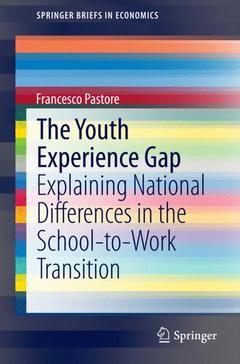The Youth Experience Gap, 1st ed. 2015. Corr. 3rd printing 2014 Explaining National Differences in the School-to-Work Transition SpringerBriefs in Economics Series
Auteur : Pastore Francesco

?The education to work transition of young people is key to a successful work-life and to fight youth unemployment. The book provides an impressive outline of the facts and convincing insights of the potential causes. This offers a large and broader audience help to adjust properly to achieve a better life.?
Klaus F. Zimmermann, IZA, Bonn, Germany
This work points to the youth experience gap as a key concept to explain the meager employment opportunities and earnings many young people face.The transition from education to work remains a long dark tunnel around the world. However, this book shows that there are striking differences between countries: in Germany, the young people of today are no worse off than their adult counterparts, while in Southern European and Eastern European countries they fare 3 through 4 times worse.
The current economic and financial crisis has further exacerbated the situation for young people in many advanced economies. Observers are divided as to the optimal design of youth employment policy. Liberalists believe that the market itself should address youth disadvantages. More flexible labor markets should also guarantee greater labor turnover, including temporary work, so as to allow young people to move from one job to the next until they accumulate the work experience they need to become more employable and find the right career. In contrast, other economists oppose approaches focusing on entry flexibility and temporary work, claiming that the former type helps only the most skilled and motivated target groups, while the latter only allows young people to gather generic, not job-specific work experience.
Francesco Pastore [Ph.D. (Sussex); Dottorato ("Federico II"); M.Sc. (Coripe-Piemonte); Laurea ("Federico II")] qualified as full professor of Economic Policy and as Associate Professor of Economics and Economic Statistics in 2013. Currently, he is Associate Professor of Economics at Seconda Università di Napoli, research fellow of the IZA of Bonn, Secretary of the Italian Association of Labor Economists, and member of the executive board of the Italian Association of Comparative Economic Studies.
He is a member of the editorial board of a number of journals, such as, among others, Sage open, Scuola democratica – Learning for Democracy, Review of Middle East Economics and Finance, Romanian Journal of Economic Forecasting. His research activities have embraced such issues as the school-to-work transition, regional unemployment and industrial restructuring, economic inequality, gender discrimination, the determinants of trade and capital flow, the transition from plan to market, the analysis of non-profit organizations.He has acted as a consultant for, among others, the EU Commission, ILO, UNDP and World Bank.
In addition to this monograph, he has published two edited books for Springer and three special issues of the International Journal of Manpower and a number of scientific articles in such journals as, among others: Journal of Economic Surveys, Stata Journal, Economics of Education Review, European Journal of Development Research, Economics of Transition, Comparative Economic Studies.
He regularly contributes columns to such online popular magazines as Social Europe, Lavoce.info, Linkiesta, NelMerito, Learning4. His evidence based, policy oriented and thought-provoking columns are the object of much debate not only in the academic world, but also in all social networks.See interview with the author: http://www.europeandme.eu/27legs/1592-economics-of-education-in-europe &nbs
Provides a new interpretative framework to understand the youth disadvantage on the labor market
Discusses advantages and shortcomings of youth employment policy in many EU and non-EU advanced economies
Includes tips for practitioners and policy makers on how to better define employment policy and better organize public and private employment services
Includes supplementary material: sn.pub/extras
Date de parution : 09-2014
Ouvrage de 61 p.
15.5x23.5 cm
Disponible chez l'éditeur (délai d'approvisionnement : 15 jours).
Prix indicatif 52,74 €
Ajouter au panier


